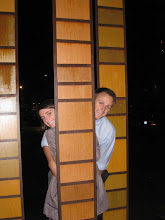Monica Guzman was introduced as the first 'all digital' reporter to work for the Seattle Post-Intelligencer. She maintains this blog for the paper and offered attendees perspectives on her position, the difference between journalists and bloggers and how the two interact.
Jim Vesely, the Seattle Times editorial page editor, followed with great opinions on who the information gatekeepers were/are and how readers use blogs and online outlets as a self-identifying tool. He argued that blogging has a strength in it's immediacy but we need to be aware of the tool's foundation.
Kim Ricketts, the founder of Book Events, described the book industry under turmoil and the impossible truth that book stores and publishers can no longer control where and in what form people get text.
Andrea Gates Sanford, principal of Watchdog Graphics Production, taught that sustainability is not about the green but rather is a method for getting current economic needs met while working to maintain a good quality of life for future generations. She shared that people have become accustomed to cheap computing, but acquisition, maintenance and disposal are issues to be noticed.
So, what did I learn?
Before the panel even began, I was speaking with someone who noted that the loss of journalism is a loss of democracy. At first I didn't agree, given the fact that now, more than I've ever noticed before, people really are 'professional communicators' working to get information to the people they care about. Later, Ms. Gates Sanford articulated what I had been thinking: that it's about a 'loss of medium, not a loss of message'. By the end of the presentation, however, I realized that investigative journalists, these 'smart people' do provide a foundation for everything we normal people write about online. Mr. Vesely correctly pointed out that very few bloggers or Tweets come from someone uncovering news on their own, oftentimes what we write about is a reaction to what we've read from a credited source. Maybe our democracy will suffer after all.
I learned about the importance of medium today. Ms. Ricketts drew attention to a successful bookstore in San Francisco where prominently displayed in the center of the store is a computer kiosk with Amazon.com on the homepage. She mentioned that books will become a luxury item and most material we will download when we need it.
I learned about the journalist's new job description today. According to Ms. Guzman, journalists in the past would hold on to articles until they were complete and perfect. People today won't wait that long. Whereas in the past there would have been time to wait for quotes and interviews, the online audience today would rather accept a portion of a story with a 'to be continued...' notice and a follow up post than wait for the finished product. In the same way, online audiences, she said, are more forgiving with accuracy. The reason being, if a writer is constantly making factual errors and asking for forgiveness, eventually trust will be lost and the writer will be gone anyway.
The audience was concerned about the public becoming less informed by online outlets. I am guilty of reading what I want and skipping over less interesting content myself. I think of this discussion as the argument for a liberal arts education vs. going to a technical school. Liberal arts degrees take more time, cost more money and some classes aren't always as interesting. A technical degree is applicable now, focuses on what you want to learn, and is quicker to obtain. Graduating from a liberal arts university meant I had to sit in quantitative reasoning even though I wanted to be in my campaigns class. In the same way, reading print material forces me to at least skim different opinions, headlines or advertisements. Print media forces me to broaden my perspectives the way my favorite site or writer may not.
Thank you, IABC, for a fascinating morning. Let me know if you ever need a volunteer!

No comments:
Post a Comment